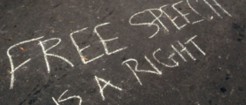Should my students be allowed to make fun of me online?
/Time magazine asks: Do students have a First Amendment right to make fun of their principals and teachers on Facebook and other social-media sites? Or can schools discipline them for talking out of school?
This question comes in reaction to two court rulings supporting the right to free speech for students. In both cases, the court said that schools were wrong to suspend students for posting parodies of their principals on MySpace — one in which a boy made fun of his principal's body size and another in which a girl made lewd sexual comments about her principal.
Both actions took place outside of school and failed to "materially and substantially interfere with the requirements of appropriate discipline in the operation of the school," the standard set by the Supreme Court in the 1969 landmark case of Tinker v. Des Moines Independent Community School District, in which students’ right to wear a black armbands in protest of the Vietnam War was upheld by the Court.
 I tend to agree with the court in these matters. The First Amendment does not stop at the schoolhouse door, and speech taking place off school grounds that does not significantly impair learning in school should be permitted.
I tend to agree with the court in these matters. The First Amendment does not stop at the schoolhouse door, and speech taking place off school grounds that does not significantly impair learning in school should be permitted.
My question is this:
Are these students subject to defamation and libel claims made by principals and teachers whose reputations have been unfairly impugned?
Having been in a similar position at one point in my life at the hands of an anonymous, non-student source, I fully understand the power of purposely manipulated, unmitigated speech, particularly when it originates from a source too cowardly to claim ownership but brazen enough to spread the word far and wide.
I support the First Amendment and a student’s right to speak, but when the speech is blatantly false and results in damage to a teacher’s reputation, I believe that a teacher has a right to legal recourse.
This is why laws relating to defamation of character and libel exist.
Unfortunately, in my case, there was no recourse since the libel was perpetrated by an anonymous source.
But when a students creates a video that falsely claims that his high school principal has made inappropriate sexual advances towards students, shouldn’t that principal be provided with the opportunity for legal recourse if it can be proven that his reputation has been unfairly and irreparably damaged?
Shouldn’t students be held accountable for the damage that they do?
A teacher’s reputation is his most valuable asset. It can mean the key factor in establishing positive, productive relationships with students and parents. When students, parents and the community implicitly trust an educator because of the reputation that he or she has earned, learning is invariably accelerated in the classroom and a teacher’s career outlook is improved considerably.
To allow students to damage that reputation and only suffer a parental punishment seems wrong to me.
While I would not want students suspended for exercising their right to free speech off campus, I would like them to be made aware of the consequences that can result from that speech when it is baseless and purposely destructive.
When actual damage is done to a teacher’s reputation, a teacher should have legal recourse.
While I cannot imagine suing a student or his or her family for a purposely false and intentionally destructive YouTube video, we cannot allow a system to exist in which students are permitted to say whatever they want about a teacher and the teacher is not afforded the same protection that the legal system provides for people outside the schoolhouse.